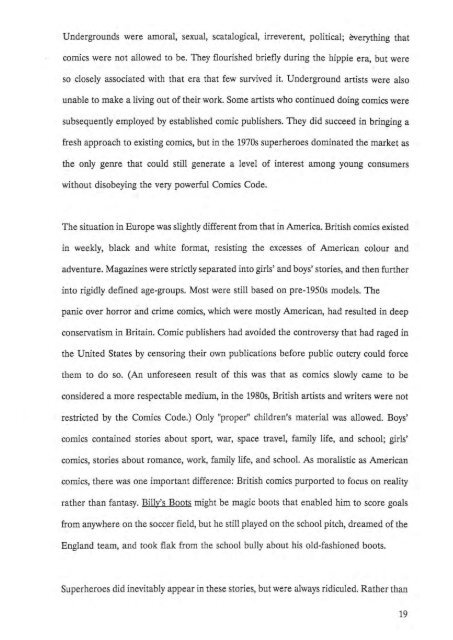Text - Rhodes University
Text - Rhodes University
Text - Rhodes University
You also want an ePaper? Increase the reach of your titles
YUMPU automatically turns print PDFs into web optimized ePapers that Google loves.
Undergrounds were amoral, sexual, scatalogical, irreverent, political; everything that<br />
comics were not allowed to be. They flourished briefly during the hippie era, but were<br />
so closely associated with that era that few survived it. Underground artists were also<br />
unable to make a living out of their work. Some artists who continued doing comics were<br />
subsequently employed by established comic publishers. They did succeed in bringing a<br />
fresh approach to existing comics, but in the 1970s superheroes dominated the market as<br />
the only genre that could still generate a level of interest among young consumers<br />
without disobeying the very powerful Comics Code.<br />
The situation in Europe was slightly different from that in America. British comics existed<br />
in weekly, black and white format, resisting the excesses of American colour and<br />
adventure. Magazines were strictly separated into girls' and boys' stories, and then further<br />
into rigidly defined age-groups. Most were still based on pre-1950s models. The<br />
panic over horror and crime comics, which were mostly American, had resulted in deep<br />
conservatism in Britain. Comic publishers had avoided the controversy that had raged in<br />
the United States by censoring their own publications before public outcry could force<br />
them to do so. (An unforeseen result of this was that as comics slowly came to be<br />
considered a more respectable medium, in the 1980s, British artists and writers were not<br />
restricted by the Comics Code.) Only "proper" children's material was allowed. Boys'<br />
comics contained stories about sport, war, space travel, family life, and school; girls'<br />
comics, stories about romance, work, family life, and school. As moralistic as American<br />
comics, there was one important difference: British comics purported to focus on reality<br />
rather than fantasy. Billy's Boots might be magic boots that enabled him to score goals<br />
from anywhere on the soccer field, but he still played on the school pitch, dreamed of the<br />
England team, and took flak from the school bully about his old-fashioned boots.<br />
Superheroes did inevitably appear in these stories, but were always ridiculed. Rather than<br />
19
















